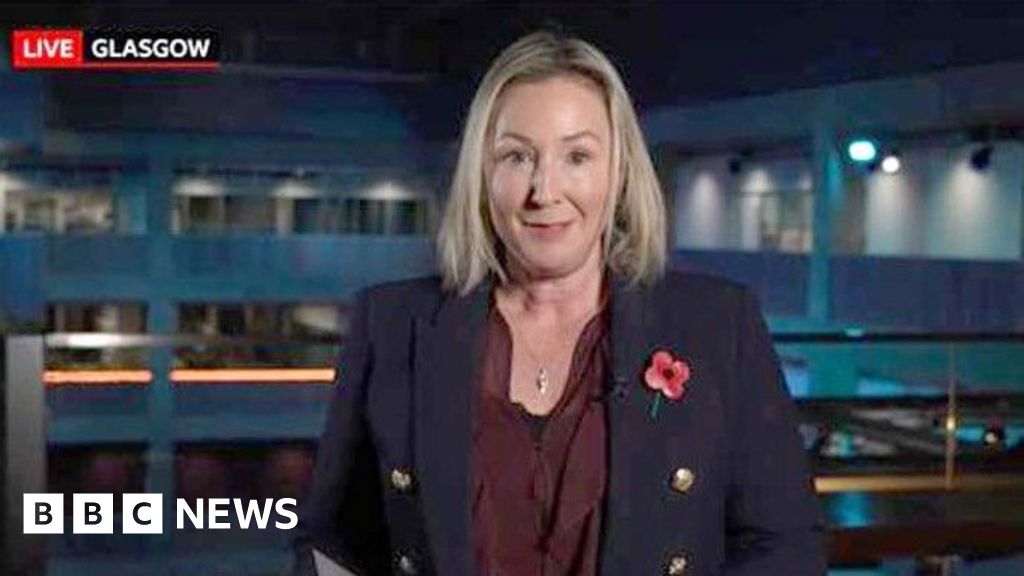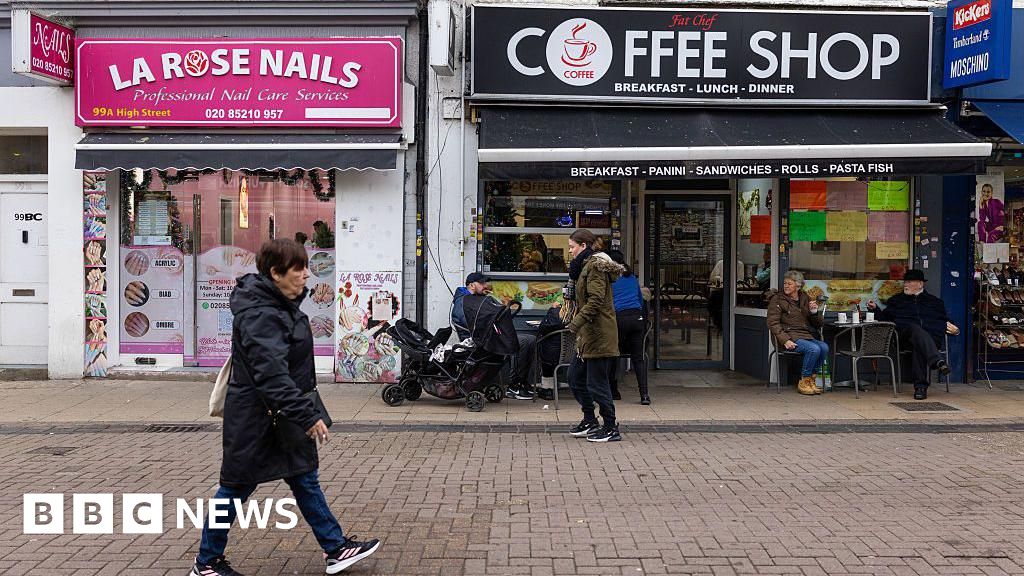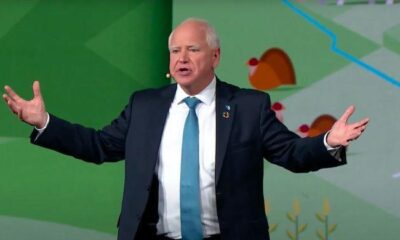Business
How my on-air ‘brain fog’ moment sparked a big debate

Zoe KleinmanTechnology editor
 BBC
BBCWhen I rather nervously shared a personal post about dealing with brain fog at work on the social network LinkedIn last week, I had no idea that it would have such an enormous impact.
It’s been viewed hundreds of thousands of times. Women have stopped me on the street to talk to me about it.
I’ve been overwhelmed by hundreds of messages from people sharing support and their own experiences of it.
Usually I cover technology news. But given the response, it felt important to talk about this as well.
“Brain fog” isn’t a medical term. But you may well know exactly what I’m talking about.
That moment when you suddenly can’t remember the word for something really obvious, or you’re mid-sentence and you lose your train of thought. It’s infuriating, and it can be embarrassing.
Where was I?
Ah yes, for me, as a woman in my 40s, it’s coincided with perimenopause – the stage in my life where my hormone levels are changing. There can of course be other neurological conditions for which brain fog can be a symptom too.
If you’re in a job where public speaking is part of what you do, it can be particularly terrifying.
“I’ve spent 30 years being professionally articulate,” wrote Janet Edgecombe, an internal communications expert.
“All of a sudden I’m forgetting the words for basic things. ‘That grey thing in the thingy that we cook chicken on’. My husband replies ‘oh, the baking tray in the oven’. Hmm. ‘Yeah, that thing’.”
 Getty Images
Getty ImagesI also heard from teachers, start-up founders having to present pitches for money to investors, women running workshops, delivering speeches – and fellow journalists trying to report live on-air, like me. But of course it can also hit mid-conversation, in a more intimate but no less frustrating way.
My post was about my decision to hold a page of notes on the BBC News at Ten. A story had broken late in the afternoon, following an already busy day, and by the time we reached 10pm, I knew I was getting tired and I could feel the brain fog.
I was going to talk about an outage that was affecting dozens of websites and apps, and I planned to use the technical jargon for it, as given by the company affected, and then explain what it actually meant.
But I just couldn’t get the phrase to stick in my head and I knew that without it, I wouldn’t manage the rest of what I needed to say.
I was reporting live from Glasgow. Like many of my professional peers, I do not have, and I’ve never had, autocue. And so, for the first time, I decided at the last minute to hold a page of notes with the offending phrase on it.
It felt to me at the time like an admission of failure. I have been trained never to use notes – unless there’s a specific legal reason why the wording of a statement, for example, has to be precise, or there are a lot of figures to remember.
Even then, I have prided myself on having a good enough short-term memory to get me through.
Using notes is discouraged in the world of public speaking. They are not permitted to anyone giving a 12-minute TED talk. The speaker is expected to memorise their speech.
Looking down the barrel of the camera and clutching that paper, live on TV, felt tough.
But around 10% of women report leaving their jobs due to menopause symptoms, according to the Fawcett Society. And research by insurance firm Royal London found that half of women going through it have considered giving up work. I don’t want to do that – and so I stuck with my solution.
To my intense relief, some people said they thought my paper looked authoritative, that they just assumed it was a breaking story and the page contained fresh information. Others asked why I hadn’t used a device instead – I suppose I thought the potential of having to fumble with a screen would feel even worse.
“Let’s start a movement: Hold your notes,” wrote Elisheva Marcus, vice president of communications at the venture capitalist firm Earlybird.
And so, the hashtag holdthenotes was born.
“Have you ever checked your testosterone levels?” menopause expert Dr Louise Newson asked me.
She says testosterone – despite its reputation for being a male hormone, and its association with sex drive and libido, is actually an essential brain chemical for both men and women, and levels fall in both genders. One of the results is brain fog.
“It’s like you’ve been drugged,” she says. “It’s really scary, a lot of people worry they’ve got dementia.”
“I remember when I had my levels done 10 years ago, and I was like ‘Thank God, at least I know why I’m feeling so awful’.”
She adds that there are studies dating back to the 1940s indicating that testosterone can improve brain function and wellbeing in women as well as men, but the randomised control studies, where participants are given either a placebo or the product itself in order to see whether it really works, have only focused on improvements to libido.
NHS-prescribed Hormone Replacement Therapy, or HRT, is traditionally a combination of oestrogen and progesterone. Testosterone is not routinely included.
Instead doctors can separately prescribe testosterone to female patients, at lower doses than given to men.
 Getty Images
Getty ImagesThere are also a myriad of menopause supplements which claim to ease symptoms including brain fog. Estimates vary but it’s a multi-billion dollar industry and its booming.
Women spend an average of £147 per year on supplements to try to alleviate their menopause symptoms, according to a survey earlier this year by the nutrition news website NutraIngredients.
“They might help a bit,” says Dr Newson.
“I do yoga every day, and that helps my brain become clear and focused, but I have a hormone deficiency, I can’t eat my way out of it, or exercise my way out of it.
“A lot of women spend a fortune trying to improve symptoms of a hormone deficiency with something else.”
Dr Joshua Chen is part of the Harvard Medical School-Massachusetts General Hospital Photobiomodulation Research Group. The team is looking at how frequencies of red light can change the mitochondria inside the brain to improve focus.
He describes it as “like a face mask, but for the brain”. It can also, he says, be applied to the Vagus nerve on the neck to reduce stress.
He has founded a company called Niraxx which markets a headband called a neuro espresso, which is designed to be worn for up to 20 minutes a day. He claims the results are instant. It has to be plugged in – there are no batteries in the device for safety reasons.
 Niraxx
NiraxxAngela Marsh is a registered nurse and a menopause coach. She says her clients often describe brain fog as feeling like they are “living life in soft focus”.
“I don’t think brain fog is taken seriously enough at all,” she says.
“Many women feel deeply unsettled by the changes they experience. They think there’s something wrong with them or they’re ‘losing it’ when in fact there’s a clear biological reason.”
As for me – well, I’ve booked a blood test to check my hormone levels. I’m going to try some red-light therapy. And you are probably going to see me holding notes a bit more often.
Business
Bengaluru Techie Tried Rapido As A Side Hustle For 4 Days: Here’s What He Made

Last Updated:
The rider chose to work mostly after ten at night. Rapido offers a 20% incentive for rides between ten pm and six am, making late-night slots more rewarding than daytime hours.

Over four days, he rode mainly at night, sometimes starting in the evening and continuing past midnight. Image: X
It began as a simple experiment. A Bengaluru resident, curious about the buzz around gig work, decided to spend a few late nights riding for Rapido to see if the money really matched the hype. He was not looking to switch careers or become a full-time rider. He just wanted to know whether a few spare hours after work could actually make a difference to his monthly finances.
Four days later, he had more than just an answer. He had numbers, experiences and a reality check that soon went viral on Reddit, sparking a wider conversation about part-time work in the city.
Why he chose Rapido and the night shift
The rider chose to work mostly after ten at night. The reason was practical. Rapido offers a twenty percent incentive for rides between ten pm and six am, making late-night slots more rewarding than daytime hours.
Another detail that caught attention was his claim that Rapido was not charging any commission on rides at the time. While he admitted he was unsure if this was permanent or linked to regulatory issues around bike taxis, the zero-commission factor clearly boosted his take-home earnings.
For him, the goal was simple. Test whether a few hours on the road could actually translate into meaningful extra income.
How the four days unfolded
Over four days, he rode mainly at night, sometimes starting in the evening and continuing past midnight.
On the first day, he worked from six thirty in the evening to nine at night and earned Rs 170. Later, between eleven at night and one thirty in the morning, he earned another Rs 460. His total for around five hours of riding came to Rs 630.
On the second day, he stayed online for about five hours and earned Rs 750.
On the third and fourth days, he rode for roughly three to four hours each night and earned Rs 420 on both days. He noted that these days were slightly slower, with fewer ride requests compared to the earlier shifts.
By the end of the fourth day, he had enough data to calculate what part-time riding really meant in practical terms.
The final numbers
Across four days, the rider clocked a total of seventeen working hours. His gross earnings stood at Rs 2220. From this, he deducted fuel expenses of around Rs 400. That left him with a net profit of Rs 1820 for the entire period.
In simple terms, he earned just over Rs 100 per hour after accounting for petrol. For some readers, that sounded modest. For others, especially those struggling with stagnant salaries and rising living costs, it felt like a useful safety net.
When the internet joined the debate
The Reddit post quickly filled with comments from people living similar double lives.
One user shared that he works in an IT firm from two in the afternoon to ten at night, earning Rs 24000 a month. After his shift, he rides for Rapido from ten pm to six am. According to him, the money he makes on the bike often matches or even beats what he earns at his desk job.
Stories like these pushed the conversation beyond one person’s experience. They raised bigger questions about whether flexible gig work is slowly becoming more attractive than low-paying formal jobs, especially for young workers.
Who this kind of work suits best
The Bengaluru rider ended his post with a grounded conclusion. Rapido and similar platforms may not be perfect, but they work well for students, people from economically weaker backgrounds and those who have free hours late at night.
Lower traffic, higher incentives and the freedom to log in and log out without long-term commitment make gig riding easier to fit around studies or a regular job.
At the same time, he did not romanticise it. Long hours, physical strain and rising fuel costs remain real challenges. This is not easy money. But for many, it is better than having no extra income at all.
A glimpse of Bengaluru’s changing workforce
This four-day experiment reflects a bigger shift in the city’s work culture.
Bengaluru is no longer a place where one job defines a person’s identity. Today, the same individual can be a software employee by day and a bike captain by night.
The story of this part-time Rapido rider is not just about earnings. It is about how people are stitching together livelihoods in a city where ambition often moves faster than paycheques.
And in those late-night rides through quieter streets and glowing phone screens, many are finding not just fares, but a new way to stay afloat.
January 09, 2026, 06:29 IST
Stay Ahead, Read Faster
Scan the QR code to download the News18 app and enjoy a seamless news experience anytime, anywhere.

Business
More businesses call to be included in pub rates backtrack

High street shops, pharmacies and music venues have called on Rachel Reeves to axe the looming increases to business rates for them as well as pubs.
The government is expected to announce a climbdown on the increases to business rates bills faced by pubs in England in the coming days.
Landlords and pub owners have been fiercely critical of the impending hikes, with more than 1,000 pubs banning Labour MPs from their premises.
But other lobby groups and backbench MPs have urged the government to widen the relief, saying many other kinds of businesses will not be able to pay the higher bills.
In her November Budget, the chancellor scaled back business rate discounts that have been in force since the pandemic from 75% to 40%, and announced that there would be no discount at all from April.
That, combined with big upward adjustments to rateable values of pub premises, left landlords facing the prospect of much higher bills.
The BBC understands the climbdown will apply only to pubs and not the whole hospitality sector.
The British Independent Retailers Association (Bira) questioned why its members -– which include high street shops, restaurants and cafes — would not be given the same relief.
Its chief executive Andrew Goodacre said independent retailers “face exactly the same challenges as pubs but have been left out of discussions about additional support”.
“Perhaps independent retailers need to follow the pubs’ example and start banning MPs from their premises too,” he said.
The British Retail Consortium (BRC) said the current business rates system “is not fit for purpose”.
Helen Dickinson, the BRC’s chief executive, said: “This latest announcement looks like another sticking plaster on a broken system rather than the more fundamental reform required.”
Jon Collins, chief executive of music venue body LIVE, said: “If the government is preparing a U-turn on business rates for pubs, it must not leave live events and arenas behind.”
The National Pharmacy Association chief executive Henry Gregg said the sector could face a 140% increase in rates, while the lobby group for gyms, pools and leisure centres said those businesses faced potential rate increases of 60%.
“Failure to provide a business rates support package to gyms, pools and leisure centres will lead to higher prices, reduced services, redundancies and in some cases the loss of gyms from our communities,” chief executive of ukactive Huw Edwards said.
Some of those lobby group concerns were echoed by MPs.
“Venues, clubs and cinemas up and down the country are already struggling for survival,” Conservative MP Dame Caroline Dinenage wrote to the chancellor on Thursday.
She said the planned rates reforms risk “pushing many over the edge”.
“The Treasury needs to be open about how it decided on the changes, while the sector desperately needs more details on the alternative support promised by the Prime Minister.”
Reeves said earlier this week that the government had reduced the rate of tax on pubs and hospitality, but the Independent Valuation Office increased what they saw as the value of those properties.
“Now we’re working with the sector to look at the implications of a range of policies and looking at planning and licensing,” she said in an interview with Good Morning Britain.
“I want to support our pubs; I want to support our high streets. That’s why we made the change to the rates. But I recognise that many paths are still struggling and we’re working with them.”
Business
Saks Global struggles to line up financing as potential bankruptcy filing looms

Pedestrians walk past a Saks Fifth Avenue store in Chicago, Dec. 30, 2025.
Scott Olson | Getty Images
Beleaguered retail chain Saks Global is struggling to line up as much as $1 billion in financing to keep its business afloat during a potential Chapter 11 bankruptcy filing, CNBC has learned.
The luxury chain has been working to secure a “debtor-in-possession” loan, which would allow it to fund operations in the event of a potential bankruptcy filing, people familiar with the matter said. But investors have so far shown little interest in lending Saks the money because they’re skeptical the company can successfully reorganize and pay them back, said the people, who spoke on the condition of anonymity because the discussions are private.
While DIP lenders get repaid before other creditors during bankruptcy proceedings, they don’t always recoup their full investment, and some investors are concerned that could happen if they finance Saks, the people said.
The storied 159-year-old department store, which now owns Neiman Marcus and Bergdorf Goodman, is both a destination and a symbol for luxury fashion, known for offering top brands like Chanel and Dior alongside up and comers like Good American. Across the entire enterprise, Saks Global has more than 70 full-line luxury stores and about 100 off-price locations.
Since Saks missed an interest payment to bondholders late last month, only a “limited number” of investors have shown interest in financing the DIP loan, while a number of others have declined to get involved, the people said.
Saks declined to comment on investor interest in its fundraising efforts.
A wide array of firms invest in companies that could be headed for bankruptcy, including top banks and private equity. However, the only firms likely to be interested in investing in Saks at this point are either liquidators that also have investment vehicles or alternative asset managers that have experience in distressed retail, one source said. Still, even some of those investors have declined to get involved with Saks’ DIP loan, the people said.
Liquidation is one of several potential outcomes Saks faces. However, if it can’t line up a DIP loan, which would be used to pay for essential expenses like payroll, rent and inventory, that scenario would be more likely. The retailer is already struggling to pay those costs.
Failure to line up financing would prevent Saks from filing for Chapter 11 bankruptcy, which would give the company a chance to reorganize and potentially find a buyer willing to take on its business as a going concern. It could then be faced with Chapter 7 bankruptcy, which is reserved for liquidation.
That could mean the end for one of the most fabled department stores in history, whose flagship store on Fifth Avenue, considered by some to be its most valuable asset, has become a global destination.
In the meantime, Saks has also been in talks with liquidators for a number of stores that are in the process of closing, but not yet the entire chain, the people said.
Saks’ troubles have been mounting since it acquired its longtime rival Neiman Marcus in a $2.7 billion deal in 2024, which was heavily financed with debt.
The tie-up between the two rivals was expected to create a luxury retail powerhouse that could better streamline costs and negotiate with vendors.
Instead, Saks has struggled to pay its vendors on time, leading to inventory gaps and declining sales. A slowdown in the overall luxury market, which has seen growth stagnate in recent years, has compounded the issues.
-

 Sports4 days ago
Sports4 days agoVAR review: Why was Wirtz onside in Premier League, offside in Europe?
-

 Politics4 days ago
Politics4 days agoChina’s birth-rate push sputters as couples stay child-free
-

 Business4 days ago
Business4 days agoAldi’s Christmas sales rise to £1.65bn
-

 Business4 days ago
Business4 days ago8th Pay Commission: From Policy Review, Cabinet Approval To Implementation –Key Stages Explained
-

 Entertainment4 days ago
Entertainment4 days agoMinnesota Governor Tim Walz to drop out of 2026 race, official confirmation expected soon
-

 Fashion4 days ago
Fashion4 days agoJacquemus hires new COO from Parisian label Lemaire
-
Sports1 week ago
Tom Wilson’s New Year’s Eve: Two goals, a fight, a win and an Olympic nod
-

 Sports4 days ago
Sports4 days agoFACI invites applications for 2026 chess development project | The Express Tribune






